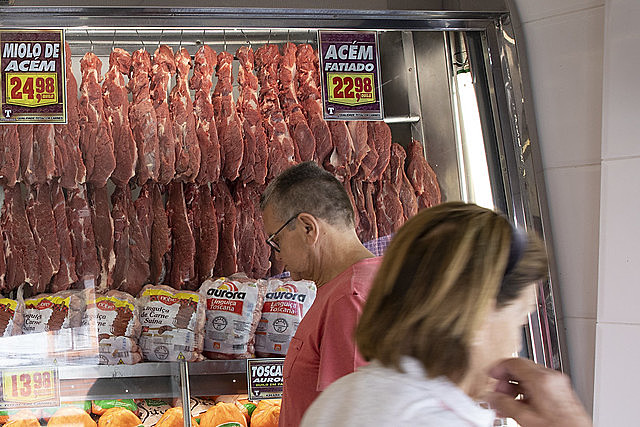For the past 11 years, Gerson Velame has successfully run a small street barbecue business in Belford Roxo, in the Rio de Janeiro metropolitan area. But in recent days, his sales fell 30 percent after he was forced to push prices up 40 percent for his steak kebabs, to 7 reais from 5 reais.
Velame’s case is not isolated. As Brazilians have watched beef prices hit a record high over the past month, they are bound to face a more-expensive-than-usual holiday season.
“I used to buy sirloin steak at 17 reais a kilo, but now it’s up to 35 reais a kilo. And I didn’t even pass on all the cost to consumers. If I did, the steak kebab would be 8 reais, but I’m trying not to lose customers here,” Velame says, adding that every day he is hearing complaints from patrons who are unhappy with the recent price rise.
While beef prices have officially increased 8.1 percent in the country, some supermarket chains have passed on higher costs to consumers, as Velame witnessed in recent weeks.
Brazil’s inflation rate reached a four-year high in November, according to the Brazilian Institute of Geography and Statistics (IBGE). And while the Internet is flooded with memes making fun of the beef price rises, the barbecue business owner and many other Brazilians do not believe consumers will be able to buy as much meat as they used to a few months ago, especially during the holidays.
An economist and professor at the Federal University of Rio de Janeiro, João Sicsú says that the Brazilian government is not likely to make an intervention to control meat prices. He explains that one of the main factors that led Brazilians to lose purchasing power was the fact that president Jair Bolsonaro has not been able to control the depreciation of the country’s currency, the real.
“Meat packers are exporting their products and earning more money for that because of the dollar exchange rate. Now, they are selling meat at the same prices they charge abroad. The real-dollar exchange rate shouldn’t have so much volatility, going up from R$2.20 to R$4.20 [a dollar]. And the government doesn’t have any policies or ideas to control the US dollar exchange rate. The Central Bank could do that,” Sicsú says.
Low-income households
A survey disclosed by Brazil’s Institute for Applied Economic Research (Ipea) on Tuesday showed that low-income households who earn up to R$1,643.78 a month feel the highest impact of inflation.
Not only the cost of food, but also housing takes its toll, as electricity tariffs have also increased recently.
“This scenario is extremely negative for those who earn less. The lower the income, the greater the budget share spent on food. That makes inflation a bigger issue for poor people,” the economist adds.
Grains and family farming
The Brazilian government’s foreign exchange policy has been taking a huge toll for end consumers when it comes to other food products as well. Wheat imports, for example, impact the price of bread, biscuits, and pasta. The prices of beans, a staple for many Brazilians, have also been on the rise in recent months, and the product is 42 percent more expensive in 2019.
The coordinator of the Small Farmers’ Movement (MPA), Humberto Palmeira, says that beef price rises are a result of the Chinese demand that is swallowing up the country’s supply, a trend that is likely to continue. And this scenario is expected to affect other food products that are part of the meat production chain, such as corn, used to feed livestock.
“Corn price rises will also boost corn production, and consequently reduce other crops,” Palmeira says, adding that policies to foster family rice farming are being neglected, especially in the North and Northeast of Brazil. “It’s impossible to move rice from the South to the entire country, and Brazil is not self-sufficient in rice, so it will have to pay more for Asian imports.” Rice is also a staple in the country.
The MPA coordinator underscores that the attacks against traditional peoples and communities and their food production also makes it even harder to promote an alternative to agribusiness and the oligopoly of big businesses that set food prices.
Palmeira says that it’s not just about neglecting family farming policies, but there is actually a scenario in which “quilombolas, peasants, and small landholders are being brutally attacked and pushed out of their territories to expand the production of commodities.” “It’s not a lack of policies, but actually a very clear policy, and now it will impact the access to food of an entire population.”




